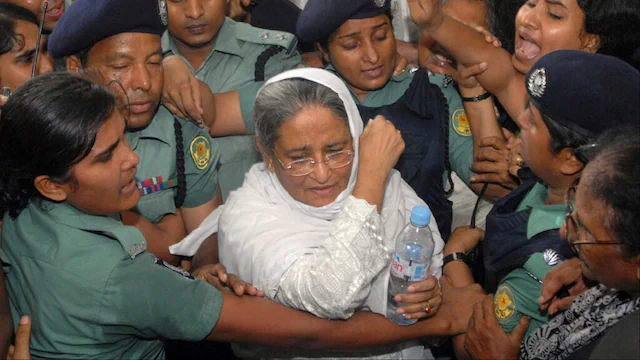Bangladesh’s deposed Prime Minister Sheikh Hasina was sentenced to six months in prison on Wednesday by the International Crimes Tribunal (ICT). According to local media reports, she was prisoned in connection to a contempt of court case. The verdict was delivered by a three-member bench of ICT-1, led by Chairman Justice Md Golam Mortuza Mozumder.
Sheikh Hasina’s sentence will begin from the date of her arrest or voluntary surrender. Alongside Hasina, Shakil Akand Bulbul, a political figure associated with the Bangladesh Chhatra League (BCL). He was handed a two-month prison term under the same ruling.
Contempt Charges Linked to Leaked Phone Call
According to reports, the contempt case arose from a leaked phone conversation. The call was recorded in October last year between Hasina and Bulbul. In the recording, a voice identified as Hasina reportedly stated, “227 cases have been filed against me, so I have obtained a licence to kill 227 people.”
The Prosecutors argued that this statement amounted to contempt of court. They said it threatened the judicial process and sought to intimidate individuals involved in ongoing war crimes. The trials linked to last year’s mass uprising in Bangladesh.
First Sentence Since Exile Abroad
This marks the first legal sentence against the ousted Awami League leader since she fled Bangladesh. Hasina fled Bangladesh 11 months ago following a student-led protest uprising in August. Three days after her ouster, Nobel laureate Muhammad Yunus, 85, was appointed to lead Bangladesh’s interim administration.
Hasina has since been living in exile in India and has refused to return despite court orders. The banned Awami League party, in a statement from London, denounced the trial as a “show trial” and asserted that Hasina “categorically denies the charges.”
Charges of Crimes Against Humanity
On July 1, Hasina was formally charged with crimes against humanity, including abetment, incitement, complicity, facilitation, conspiracy, and failure to prevent mass murder during a brutal government crackdown on protesters last year. According to United Nations estimates, up to 1,400 people were killed between July and August during the protests, which Hasina’s government sought to suppress violently in a failed attempt to retain power.
Hasina is currently on trial in absentia, alongside two other officials. Prosecutors allege she holds overall command responsibility in three ongoing cases tied to the violent suppression of the uprising.
These include the murder of a 23-year-old student protester, Abu Sayeed; the killing of six individuals in Dhaka’s Chankharpul area; and the killing and burning of six people in the Ashulia suburb. One co-accused, former interior minister Asaduzzaman Khan Kamal, remains a fugitive, while ex-police chief Chowdhury Abdullah Al Mamun is in custody.


